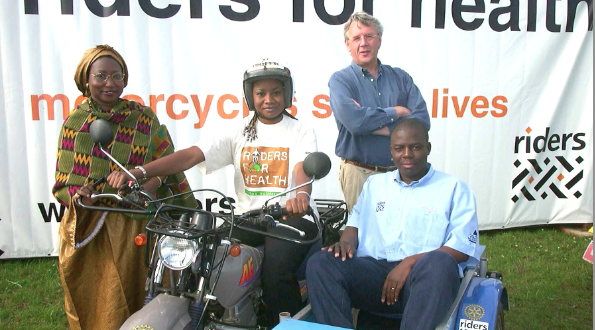Rural communities in The Gambia, West Africa, will benefit from improved access to healthcare due to the Ford Motor Company’s Smart Mobility pilot program.
Ford recently equipped 50 motorcycles serving Riders for Health medical services teams in The Gambia, one of the smallest and poorest countries in Africa, with sensor technology so that the medical services group can collect data and mapping coordinates. This data is used to optimize the delivery and provision of medical services and supplies, particularly in remote areas of the country.
Pregnant women, young children and those with medical conditions are amongst the most vulnerable in these regions, and will benefit most through an improved supply of vaccines, medication and treatment.
“Mobility means more than just moving people. For remote communities in The Gambia, mobility facilitates the delivery of life-saving healthcare services to those in need,” said Arthur Zysk, research analyst at Ford, leading the Data-Driven Healthcare experiment. “At Ford, we’re looking at the impact of mobility on the human condition and are committed to using technology to enable real, measurable change through innovative solutions.”
For healthcare practitioners in The Gambia, motorcycles are essential as they allow quicker, more affordable transportation to remote areas across hazardous terrain, especially during the country’s intense rainy season. Before the use of motorcycles, healthcare workers used bicycles or walked, limiting their access to a fraction of the population that can now be reached by motorcycle.
This unique mobility project uses Ford’s OpenXC sensor kits, which are fitted to the motorcycles. These innovative units gather information such as the motorcycle’s wheel speed, acceleration and altitude, as well as traffic patterns, pedestrian data and road conditions that help to create maps of remote regions.
The OpenXC system records every trip, and is accessed via an application on a mobile phone provided by Ford. When the rider logs on to the internet, the data is uploaded to Ford’s Data Driven Healthcare program that collates the detailed information and builds a database of the Riders for Health team’s routes, the terrain and the vehicle’s and operating parameters as well as environmental conditions like altitude and ambient pressure.
“The goal of Ford’s Data Driven Healthcare program is to utilize smart technology to enhance and improve people’s lives through better access to medical care across the continent,” Zysk said. “Ultimately it will help facilitate and expand the work done by healthcare, ambulance and emergency services to support millions more people in Africa.”
“Ford is helping us to better understand the modes of transportation that we are using in our programme,” said Therese Drammeh, Riders for Health Country Director for The Gambia. “By looking at how our motorcycles and pick-up trucks are responding to the needs of the community, we will be able to make them more efficient.”
Riders for Health is a medical service group that equips healthcare providers with motorcycles and technical support in eight West African countries. Currently, Riders for Health services more than 1.8 million people in The Gambia.
Ford explores new territory
Ford is monitoring how Riders for Health motorcycles are used at an outreach program in the small town of Basse in The Gambia, where Ebrima Kuruma works as the sole health worker for three communities, providing medication and treatment to pregnant women and young children.
“I have a lot of motherless kids,” Kuruma said. “I see a lot of pregnant women who need proper attention and need to be taken care of.”
In another even more remote village on the North Bank of The Gambia River, a lone nurse uses her motorcycle to travel to neighbouring communities testing for diseases such as tuberculosis and leprosy.
With its OpenXC technology already installed on previously donated Ford Ranger pickup trucks, Ford is already helping Riders for Health improve its maintenance systems and vehicle fleet logistics. The rollout of the motorcycle sensors will include devices for technicians that support the health practitioners with regular vehicle servicing as well as rider training.
From the Ranger fleet, the team has already used GPS and fuel level information to track routes, identify stop locations, fuelling depot locations and fuelling habits. On-going efforts will use analytics to look into topics like route optimization, vehicle performance attributes, and feedback on driver/rider behavior.
Ford is gathering and analyzing vehicle data collected by OpenXC as part of Ford Smart Mobility, its plan to take connectivity, mobility, autonomous vehicles, the customer experience, and data and analytics to the next level. Learnings could be expanded to other transportation modes – helping ambulance and emergency services providers improve efficiency across the world.
 ..:: AUTO REPORT AFRICA ::..
..:: AUTO REPORT AFRICA ::..




